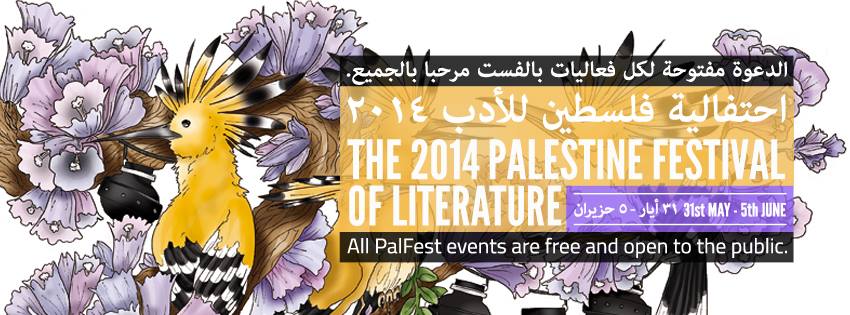The power of Palestinian literature to write wrongs
By Khaled Diab
The power of Palestinian literature lies in its ability to make a word of difference, gradually shifting perceptions and, through them, reality.

Wednesday 11 June 2014
The annual Palestine Festival of Literature (PalFest), which took place last week, was held in five different cities: Ramallah, Jerusalem, Bethlehem, Nablus and Haifa. Into its seventh edition, this year's PalFest, despite being run on a shoestring, attracted prominent Palestinian, Arab, European, American, Asian and African names.
PalFest has managed to skirt around the movement restrictions imposed by the Israeli military to field a diverse programme including readings, theatrical performances, music, panel discussions and workshops.
The festival's slogan is “the power of culture over the culture of power”. This echoes the ancient adage “The pen is mightier than the sword,” which has been recycled in various forms since at least the Assyrian sage Ahiqar in the 7th century BC.
But in a world where the sword – or more accurately the gun, the missile and the jet fighter – so often silences the word, it is easy to view literature's power to write wrongs with scepticism and, hence, regard it as a preoccupation people living under occupation can ill afford.
Even the late Mahmoud Darwish, widely regarded as Palestine's national poet and one of the main architects of modern Palestinian consciousness, was not immune to such doubts. “I thought poetry could change everything, could change history and could humanise,” he said in a 2002 interview. “But now I think that poetry changes only the poet.”
Despite these misgivings, the culture of power does sometimes feel insecure in the face of the power of culture.
Although Israel, alongside Lebanon, probably has the freest literary scene in the Middle East, this freedom often does not extend to the Palestinians. This was on ample display during the second edition of PalFest in 2009, when Israeli police tried to stop the Jerusalem leg of the festival from taking place, prompting the French Cultural Centre and British Council to step in to save the day.
This demonstrates that the pen can sometimes intimidate the sword.
In my view, the power of literature lies in its ability to make a word, rather than a world, of difference. It doesn't cause dramatic, immediate change in the real world, but it can gradually shift perceptions and consciousness and, through them, reality.
Literature can and does play a number of vital roles in the context of the Palestinian struggle. For instance, whether in the form of fiction or non-fiction, it is a peaceful means of resisting Israel's military machine, both by boosting morale and highlighting the plight of Palestinians.
Traditionally, Palestinian literature has served the function of chronicling the dispossession of the Palestinian people and of keeping their memory and identity alive. This is epitomised not only in the poetry of Darwish but also in the defining short stories and novels of Ghassan Kanafani, who was assassinated in 1972 in Beirut by, many suspect, the Mossad.
Literature is also, as Darwish pointed out, a vehicle for humanising the Palestinians. This is not only in the eyes of those who regard them as two-dimensional villains but also those who see them simplistically as superhuman heroes or poor victims.
A new generation of writers and other artists has taken it as their mission to highlight this ordinary human experience, albeit in extraordinary circumstances. Such run-of-the-mill Palestinians “need to be fictionalised,” in the view of Selma Dabbagh, a British-Palestinian lawyer-turned-novelist and playwright, because “the media, if it saw them at all, would be more likely to see them as victims, which is a flattening vision.”
Literature can also be a conduit for self-reflection and criticism of the shortcomings of Palestinian society itself. An example of this was presented at PalFest by Palestinian-American poet Susan Abulhawa when she recited a poem from her collection My Voice Sought the Wind, in which she reflects on the equal sacrifices women must make for the cause but the unequal returns they receive:
The first time your husband hit you
It nearly knocked the country off your back
Literature is also a means of displaying solidarity. “Your very presence here signifies your support in these times of isolation,” Michael Sansour, the executive vice-president of Bethlehem University, one of the venues of the festival, told the assembled writers and journalists.
Caught between the walls imposed by the Israeli occupation and Arab reluctance to scale them, Palestinians have been incredibly isolated not only from the wider world, but even their own neighbourhood. PalFest, which is the brainchild of the acclaimed Egyptian-British author Ahdaf Soueif, was created partly to remedy this.
But literature is not just about resistance but can also pave the way to coexistence by bridging the chasm of perception and misconception between the two sides.
“[Elias] Khoury's Bab al-Shams influenced my thinking lots, as did Raja Shehadeh's Palestinian Walks,” observes Shuli, an Israeli acquaintance. “They further fleshed out things that I sensed but couldn't prove with statistics and history, filled gaps.”
This bridge-building potential is well embodied in the unlikely friendship and intellectual companionship between the late Egyptian novelist Naguib Mahfouz and Sasson Somekh, the Iraqi-Israeli poet and academic whose research brought Mahfouz into the international limelight.
But, above all, the writer can imagine a better tomorrow. “I dream of the day when,” Mahfouz once confided in Somekh, “thanks to the co-operation between us, this region will become a home overflowing with the light of science, blessed by the highest principles of heaven.”
—
Follow Khaled Diab on Twitter.
This article first appeared in The National on 4 June 2014.


“writing wrongs” I like that